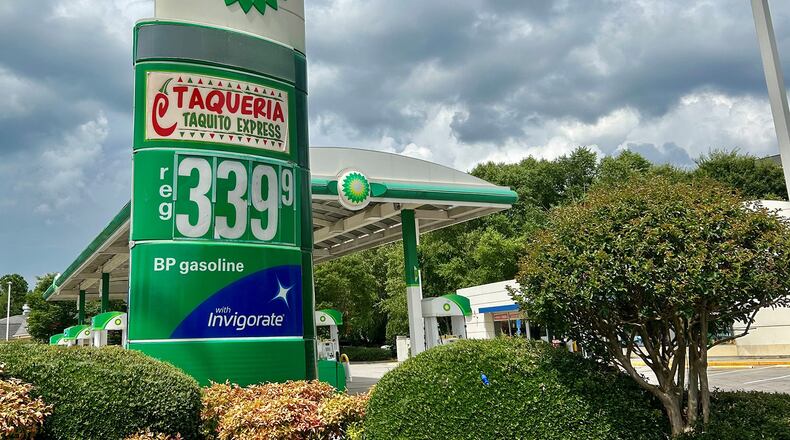Metro Atlanta drivers hitting the road for Independence Day will pay less than the national average for gasoline — at least until they are a ways from home — but prices are still about 18 cents a gallon above last year’s.
Gas averaged about $3.34 a gallon in metro Atlanta on Tuesday, according to Gas Buddy, which collects fuel information from around the country.
Late last year, Gov. Brian Kemp lifted a suspension on the state’s gasoline tax. The suspension had been ordered when prices were higher, so the lifting of it added about 31.2 cents back onto pump prices.
The national average now is roughly $3.50, about the same as the U.S. average was a year ago.
The past few months had seen the key elements of supply and demand conspire to produce a moderation in prices, said Montrae Waiters, spokeswoman for AAA-The Auto Club Group.
“Slack demand, rising supply, and low crude oil prices continued to chip away at gas prices,” she said.
But slack, the demand is not going to be this week, since the July 4th holiday is one of the year’s biggest travel days, with highways and airports often clogged. This year, an estimated 45% of Americans are expected to travel, most on the move by vehicle, and most of those vehicles are burning gasoline made from refining oil.
As the surge of holiday travelers picked up, so have prices, rising about 4 cents in the past week.
In the Southeast, Florida has the most expensive gasoline, averaging $3.46 a gallon, followed by Georgia, North Carolina at $3.23, South Carolina at $3.21, Alabama at $3.12 and Tennessee at $3.10.
Drivers in electric vehicles, of course, have different issues, like finding a charging station. Those locations are relatively common along highways in Georgia, though not nearly as ubiquitous as gasoline-pumping stations.
At least for now, gas prices are not affected by the weather, but that could change.
If the hurricane season is as active and destructive as some experts predict, the fuel market can move dramatically, said Patrick DeHaan, senior petroleum analyst at Gas Buddy. “While the first half of the summer has been relatively smooth sailing, the road ahead may be bumpy.”
The season’s first big storm — Beryl, a Category 5 hurricane — is barreling toward Jamaica and Central America this week and while dangerous, is not likely to affect fuel production and pipelines.
In contrast, any serious storms that hit the Gulf of Mexico can shut down pumping from rigs, temporarily stop refineries from turning oil into gasoline and cut off the pipelines that carry that fuel to the Southeast and beyond.
In the past, storms like Katrina and Rita in 2005 caused not only a spike in prices, but a shortage of gasoline.
Metro Atlanta drivers have seen some unpleasant price spikes.
After the 2022 Russian invasion of Ukraine, global oil markets were roiled for months, while the U.S. economy was in the midst of a post-pandemic surge that spurred demand for fuel. That combination sent gas prices in Atlanta to a record average high of $4.54 a gallon.
However, in terms of buying power, the most painful prices came in 2008, when prices crested at $4.11 a gallon. When inflation is taken into account, that price is the equivalent of $6.12 today, according to the Bureau of Labor Statistics, which tracks inflation.
In contrast, when tens of millions of drivers were not driving because of COVID-triggered shutdowns in 2020, gas prices plummeted.
Average gas prices*, metro Atlanta
Tuesday: $3.34
Monday: $3.34
One week ago: $3.31
One month ago: $3.38
One year ago: $3.16
Two years ago: $4.40
Three years ago: $2.88
Four years ago: $1.95
Five years ago: $2.63
All-time high**: $4.54 (July 2022)
*For one gallon of regular gasoline
**Price not adjusted to account for inflation
Source: Gas Buddy
About the Author
Keep Reading
The Latest
Featured




